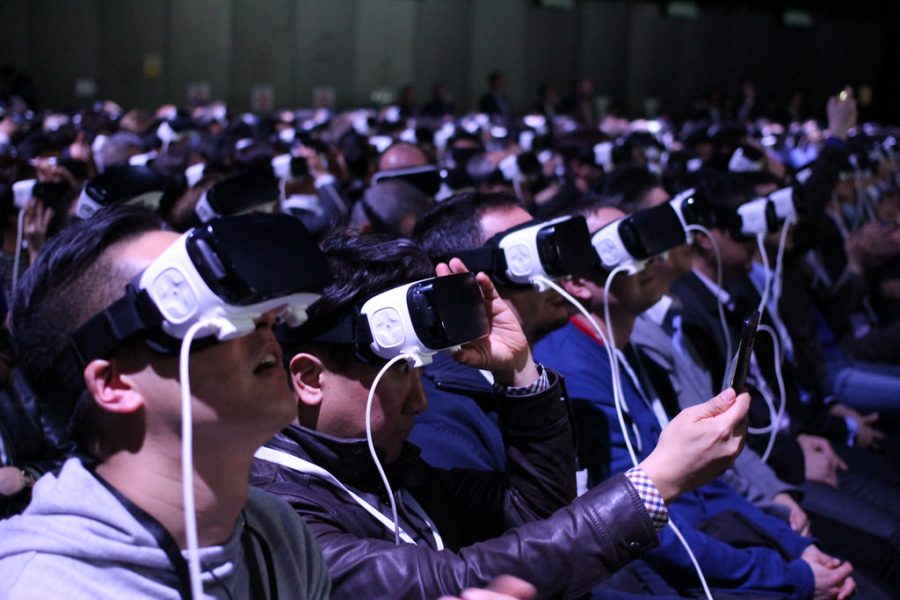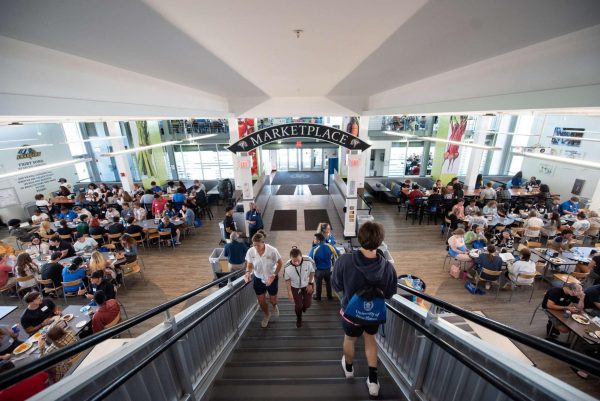University Hosts Virtual Reality Symposium
On Friday (March 23), the University of New Haven hosted the “Feeling is Believing: Augmented and Virtual Reality Symposium” sponsored by the Office of eLearning and the Department of Communications. The purpose of the symposium was to show the various ways that students can develop empathy, interact with other cultures and environments, and have shared experiences through Augmented Reality(AR) and Virtual Reality(VR).
Director of eLearning, Bonnie Riedinger began the event by introducing the topic and how Virtual Reality can allow us to create empathy through the VR environments. Reidinger then introduced the keynote speaker, Dr. Michael Casale, the Chief Science Officer of STRIVR. They focus on using VR technologies to share experiences between people such as training football players, or employees of a Chipotle. Casale explained this is done through something called the Proteus Effect: the tendency for people to assume the traits of their online avatars. A reference was made to a study on World of Warcraft, where players were assigned a specific avatar and the results correlated to the definition of the Proteus Effect. Casale is interested in the idea of using this phenomenon to show how we can connect to each other by experiencing events from another’s point of view. Most people associate Virtual Reality with video games, and when Casale was asked the importance of his work with VR, he said that associating VR with gaming would make it admissible, but it is important that people know the applications of VR that can help improve real life.
After the keynote, attendees could visit one of three speakers in two different hour-long sessions. In the first session, Kathryn Mammel, the Director of Operations and Legal Studies at Shared Studios, discussed her company and their work with portals. Portals are golden shipping crates that are moved around the globe and provide a way for different communities to meet and talk via real time video chat. This offers an intimate and safe space that makes the two strangers feel like they are sharing the room. Shared_Studios has over 30 portals located around the world and have had over 80,000 people use a portal since they were first implemented in 2015. They are now developing a school bus into a portal so that they can easily move it from location to location. Mammel was asked how important she thought it would be to implement these portals into college campuses like the University of New Haven.
“That would be my dream for portals. Students would be able to start their day with a coffee and talking to someone from Kazakhstan and end it with mentoring someone in prison,” she said. Portals would also provide a unique way for students to get a multicultural experience without having to study abroad.
David Livingston who is an Arts and Design Professor at the University of New Haven presented a talk on how virtual reality affects the fine arts. He walked attendants through the process by which virtual reality worlds are created. In one of his classes, Livingston and his students used the Unity program to create 3-D environments that could be experienced in virtual reality. Livingston’s talk was to show that art has evolved since he started with it and it is only going to keep evolving.
Attendees reconvened to listen to a talk by Michael Nichols, the Director of Sales at AbelCine. Nichols spent the first half of his talk discussing the process of how VR video is filmed. He spent the remaining time of his speech talking about the practical uses of Virtual Reality(VR) and Augmented Reality(AR) technologies and using them together (Mixed Reality) to help enhance the experiences people have. Nichols explained that VR experiences can elicit strong emotional responses and can help people who are dealing with addiction, engage children with autism, and even slow the regression of patients with Alzheimer’s.
“We’re only at the beginning,” said Nichols.
Virtual reality technologies will only keep getting better and allow us to share these same experiences in a more streamlined manner, one that doesn’t require large headsets, as those are just stepping stones, according to Nichols. He believes that this delivery of information and experiences can streamline the process of how courses at school are learned and taught.
At the end of the event, attendees got the chance to use the technologies mentioned throughout the symposium as well as project worked on by students. Both University of New Haven students and faculty alike were excited by the notion of implementing these technologies is their classroom.







